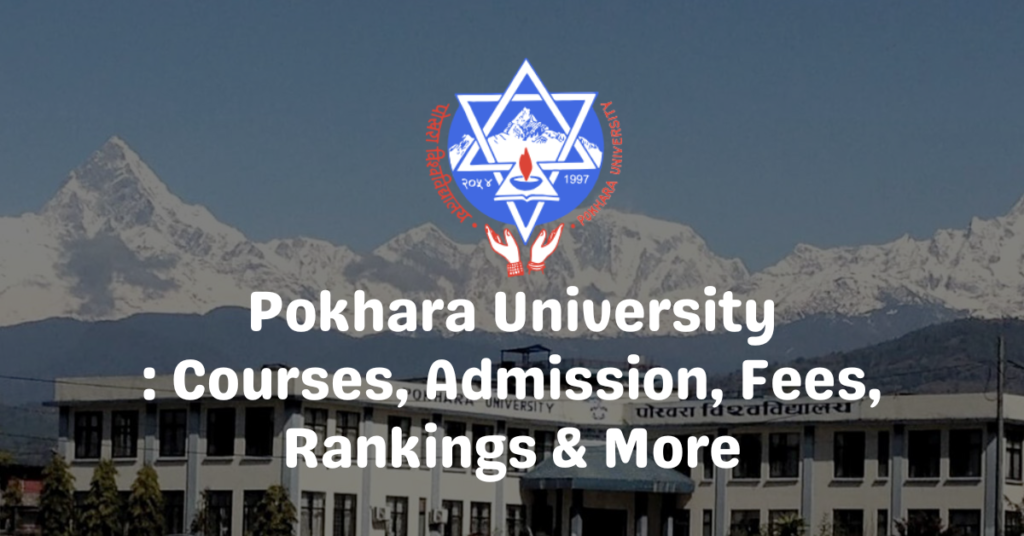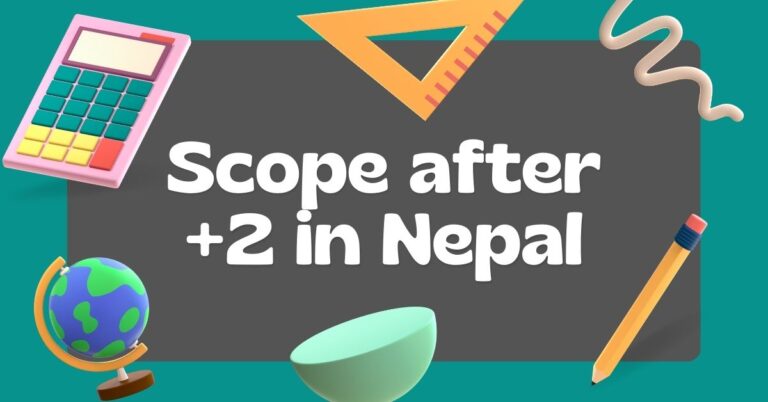Pokhara University: Courses, Admission, Fees, Rankings


Nepal’s academic landscape has grown impressively over the past few decades, and right at the heart of this educational evolution is Pokhara University (PU). Renowned for its practical approach, rigorous academics, and strong ties to both national and international educational systems, PU stands as one of Nepal’s leading academic institutions. Whether you’re a student aspiring to study medicine, engineering, management, or liberal arts, this comprehensive guide gives you every single detail about Pokhara University—covering courses, admission, fees, scholarships, and much more. Let’s dive in.
Introduction to Pokhara University
Overview and History
Established in 1997 under the Pokhara University Act 1995, Pokhara University is one of Nepal’s youngest and most dynamic universities. Situated in the tranquil valley of Pokhara, in Kaski district, it offers a beautiful mix of nature and modern academic infrastructure. The university operates under a semi-autonomous model and is backed by the Government of Nepal, ensuring both accountability and innovation.
PU was founded with a vision to decentralize higher education and ensure equitable access across all regions of Nepal. Over the years, it has expanded to include over 60 affiliated colleges, 4 constituent schools, and thousands of students in varied disciplines.
The university’s philosophy emphasizes practical learning, industry partnerships, and international collaborations, ensuring students are job-ready and globally competent upon graduation.
Vision, Mission, and Objectives
Pokhara University’s guiding principle revolves around producing skilled manpower with leadership capabilities for national development. Here’s a snapshot of its core pillars:
- Vision: To become a leading university of academic excellence promoting innovation, entrepreneurship, and societal values.
- Mission: To provide quality education that is inclusive, affordable, and aligned with the national interest.
- Objectives:
- To provide access to higher education for all, especially underprivileged communities.
- To promote research-based education.
- To establish global partnerships for academic enhancement.
Its strategic commitment to continuous improvement has made PU a preferred choice for thousands of students not just from Nepal but also from neighboring countries.
Why Choose Pokhara University?
National Recognition and Reputation
Pokhara University has steadily built a strong reputation across Nepal for its industry-focused curriculum and academic integrity. It holds a prominent place among the top universities in Nepal, ranking closely behind Tribhuvan University and Kathmandu University in multiple surveys and reports.
One of the key reasons for its growing popularity is its autonomous examination system and freedom in curriculum design. This has allowed PU to tailor its syllabus based on market demand, ensuring graduates meet current industry needs.
Moreover, the university has established affiliations with various international institutions, enabling student exchange programs, joint research initiatives, and collaborative degrees. Some reputed partnerships include universities in the USA, Germany, Australia, and India.
Unique Campus Culture and Environment
Pokhara is often referred to as the “tourist capital” of Nepal—and rightly so. Imagine studying in a place surrounded by lush hills, serene lakes, and the majestic Annapurna range in the backdrop. That’s exactly what the PU main campus offers—a peaceful, pollution-free academic environment.
The student culture is vibrant, diverse, and inclusive. Annual festivals, technical exhibitions, seminars, and cultural events make the campus a lively hub of activities. The university also promotes eco-friendly and digital learning practices, giving students a modern and sustainable educational experience.
What truly sets PU apart is its student-first approach—small class sizes, approachable faculty, and practical exposure through internships and projects. It’s not just about bookish learning; it’s about building careers.
Pokhara University Courses & Programs
Undergraduate Programs
Pokhara University offers a wide range of Bachelor’s degree programs under different faculties. These include:
- Bachelor of Business Administration (BBA)
- Bachelor of Computer Application (BCA)
- Bachelor of Engineering (Civil, Software, Electrical, Electronics, IT, etc.)
- Bachelor of Pharmacy
- Bachelor of Public Health (BPH)
- Bachelor of Science in Medical Laboratory Technology (B.Sc. MLT)
- Bachelor of Nursing Science (BNS)
- Bachelor of Arts in English and Development Studies
The undergraduate programs are typically 4 years long, except for specialized fields like nursing and pharmacy which may vary. PU’s curriculum is continually updated to reflect global trends and local demands.
Each program includes:
- Core subjects
- Elective papers
- Practical training
- Final year projects or internships
This approach ensures students not only gain theoretical knowledge but also get hands-on industry experience.
Postgraduate and PhD Programs
For those looking to continue their education, PU also offers a wide variety of Master’s and Doctoral level programs, such as:
- Master of Business Administration (MBA & EMBA)
- Master of Engineering in Structural Engineering, Computer Engineering
- Master of Science in Environmental Management
- Master of Public Health (MPH)
- Master of Pharmacy (Clinical & Industrial)
- MPhil in English, Development Studies
- PhD in Management, Health Sciences, and Engineering (Selected Disciplines)
These programs are designed for both fresh graduates and working professionals and include evening and weekend classes in some disciplines.
Faculties and Departments
Pokhara University operates through four main faculties:
- Faculty of Management Studies
- Faculty of Health Sciences
- Faculty of Humanities and Social Sciences
- Faculty of Science and Technology
Each faculty oversees curriculum design, exams, research initiatives, and student support services. Affiliated and constituent colleges follow the guidelines and academic policies laid out by these faculties.
Admission Process at Pokhara University
Eligibility Criteria
To gain admission to PU, students must meet basic eligibility criteria:
- For Bachelor’s programs: Completion of 10+2 or equivalent with a minimum GPA or percentage (varies by program).
- For Master’s programs: Completion of a Bachelor’s degree from a recognized institution with at least a second division or GPA as required.
- For PhD programs: A Master’s degree and relevant research proposal.
In some disciplines like Engineering, Pharmacy, and Health Sciences, specific subjects and minimum scores in Science and Mathematics are mandatory.
Entrance Examination & Admission Timeline
Pokhara University conducts Centralized Entrance Examinations for most programs through its faculties. The application process typically follows this schedule:
- Application Opens: May – June
- Entrance Exam: July
- Result Publication: August
- Classes Start: September
Students must apply online or directly at the designated faculties or colleges. Admission is granted based on:
- Entrance exam performance
- Academic record
- Personal interview (for selected programs)
Some colleges also offer quota seats for marginalized communities, international students, and scholarships.
International Student Admission
PU welcomes students from neighboring countries like India, Bhutan, Bangladesh, and beyond. International applicants must:
- Meet the eligibility criteria
- Submit translated academic documents
- Provide a valid passport and visa
- Pass the entrance test (or equivalent qualification)
English is the medium of instruction for most programs, making PU accessible for non-Nepali speakers.
Pokhara University Fee Structure
Fee Breakdown by Program
Fees at PU vary significantly depending on the program and whether the college is constituent or affiliated. Here’s a general range:
| Program | Fee Range (NPR) | Duration |
|---|---|---|
| BBA / BCA | NPR 3 – 5 Lakhs | 4 years |
| BE (Engineering) | NPR 6 – 10 Lakhs | 4 years |
| BPharm / BPH | NPR 6 – 9 Lakhs | 4 years |
| MBA / EMBA | NPR 4 – 7 Lakhs | 2 years |
| MPH / MSc / MPharm | NPR 5 – 8 Lakhs | 2 years |
Private affiliated colleges often charge more than constituent campuses. It’s always advisable to confirm directly with the specific college.
Scholarship Opportunities and Financial Aid
Pokhara University offers several scholarships for:
- Meritorious Students
- Marginalized and Indigenous Communities
- Female Students
- Students with Disabilities
Every year, up to 10% of total seats in constituent colleges are reserved for scholarship holders. The university also facilitates tuition waivers, installment-based fee plans, and government aid for economically challenged students.
Pokhara University Rankings & Recognition
National and International Rankings
Pokhara University might be relatively young compared to some giants in Nepal’s academic landscape, but it’s steadily climbing the ranks thanks to its progressive education model and strategic partnerships. In national surveys and student satisfaction indexes, PU consistently ranks among the top 3 universities in Nepal, trailing closely behind Tribhuvan University and Kathmandu University.
While Nepal doesn’t have a fully standardized university ranking system, several independent education portals and student reviews recognize PU for:
- Academic quality
- Practical learning modules
- Student satisfaction
- Campus environment
- Graduate employability
In terms of international ranking, Pokhara University is still in the early stages of global recognition. However, its affiliations with foreign universities have opened doors for joint research, publications, and student exchange programs, which is a step toward being featured in global rankings like QS World University Rankings or Times Higher Education in the future.
Awards, Accreditations, and Collaborations
Pokhara University is recognized by the University Grants Commission (UGC) of Nepal and follows its quality assurance and accreditation framework. It has also received awards for academic excellence, community engagement, and innovation.
Notable affiliations include partnerships with:
- University of Lethbridge (Canada)
- Tribhuvan University (Nepal) for research
- Asian Institute of Technology (Thailand)
- Erasmus+ programs (EU-based exchange)
These collaborations make PU’s degrees more credible and internationally acceptable. The university also regularly hosts international conferences, faculty development programs, and seminars in collaboration with foreign academic bodies.
Pokhara University Affiliated and Constituent Colleges
List of Major Constituent Colleges
Pokhara University operates four key constituent schools under its direct administration:
- School of Engineering (SoE)
Located in Pokhara, this school offers a wide range of undergraduate and graduate programs in Civil, Electrical, Software, and Computer Engineering. - School of Business (SoB)
Situated in Lekhnath, it provides BBA, MBA, and EMBA courses and is known for strong industry partnerships. - School of Health and Allied Sciences (SHAS)
Offers programs like BPharm, BPH, and MSc in Clinical Pharmacy, making it one of the most sought-after colleges in Nepal for health sciences. - School of Development and Social Engineering (SDSE)
Provides courses in Development Studies, Social Work, and English Literature.
These colleges have a highly competitive admission process, lower tuition fees compared to private institutions, and are preferred for quality and credibility.
Top Affiliated Colleges
PU has over 60 affiliated colleges across Nepal. Some notable ones include:
- Ace Institute of Management (Kathmandu) – Known for its MBA program
- Crimson College of Technology (Butwal) – Strong in health sciences
- Pokhara College of Management (Pokhara) – Offers top-tier BBA and BHM programs
- Nepal College of Information Technology (NCIT) – One of the best for IT & engineering
- Lumbini Engineering College (Rupandehi) – Popular for BE programs
Affiliated colleges follow PU’s syllabus, examination system, and grading but often have separate infrastructure, faculty, and fee structures.
Students can choose between constituent and affiliated colleges depending on location preference, budget, and specialization.
Hostel, Campus Facilities & Student Life
Hostel and Accommodation
Pokhara University provides on-campus hostels for both boys and girls, although space is limited and preference is given to students from remote areas. The hostels are equipped with:
- Furnished rooms (single/shared)
- Wi-Fi and study areas
- Clean bathrooms and laundry facilities
- 24/7 security
- Mess services with nutritious meals
For students not accommodated in hostels, private rentals and PGs are readily available around the campus area with monthly rents ranging from NPR 5,000 to NPR 12,000 depending on location and amenities.
Library, Labs, and Infrastructure
The university boasts state-of-the-art infrastructure, including:
- Central and departmental libraries with access to physical and digital resources
- Fully equipped laboratories for engineering, pharmacy, and health sciences
- Computer labs with high-speed internet
- E-learning platforms and digital classrooms
- Seminar halls, auditoriums, and research centers
These facilities ensure that students have everything they need for both academic and personal growth.
Student Life and Extracurriculars
At PU, learning goes beyond books. The university encourages a well-rounded student experience through:
- Clubs and Societies: Literature clubs, tech forums, cultural societies, and business groups
- Events and Fests: Annual sports day, inter-college debates, cultural week, and musical nights
- Volunteering & Outreach: Environmental cleanup drives, community health camps, blood donation programs
Students can engage in national-level competitions, internships, and social work initiatives, making their time at PU both fun and meaningful.
Career Opportunities and Alumni Network
Internships and Campus Placements
Pokhara University places a strong emphasis on career readiness. Most undergraduate and postgraduate programs incorporate compulsory internships or project work, giving students real-world exposure.
The School of Business and Engineering has excellent connections with industries, allowing students to intern at:
- Banks and financial institutions
- Tech companies and IT firms
- Construction and infrastructure companies
- Hospitals and health agencies
- NGOs and INGOs
Several affiliated colleges also organize career fairs and on-campus recruitment drives, where reputed companies come in for hiring.
Notable Alumni and Industry Presence
PU has produced thousands of professionals across various industries. Some notable sectors where PU graduates are making a mark include:
- Information Technology and Software
- Healthcare and Pharmaceuticals
- Financial Services and Banking
- Education and Academia
- Government and Public Administration
Alumni of PU have gone on to pursue higher studies abroad, build startups, and take up leadership roles in Nepal’s top organizations. The university maintains a robust alumni network, which is a great resource for mentoring, networking, and job referrals.
Research, Innovation, and Global Outreach
Research and Development
One of PU’s growing strengths is its focus on research and innovation. It has dedicated research centers in disciplines like:
- Environment and Climate Change
- Engineering and Technology
- Public Health and Policy
- Social Sciences
Faculty and students frequently collaborate on research projects, publish in international journals, and present at national and global conferences. Research grants are available through UGC and international bodies.
Global Outreach and International Programs
To promote global education standards, Pokhara University has signed MoUs with several international universities. These partnerships focus on:
- Student and faculty exchange programs
- Joint degrees and dual certification
- International internships and placements
- Collaborative research and publication
Students enrolled at PU often participate in Erasmus+, DAAD, and SAARC academic programs, offering them global exposure and enhancing their academic profile.
Scholarships and Financial Assistance at Pokhara University
Types of Scholarships Available
One of the most encouraging aspects of studying at Pokhara University is the availability of numerous scholarship programs and financial assistance schemes designed to support deserving and underprivileged students. The university believes that no student should be deprived of quality education due to financial hardship.
Here are the primary types of scholarships available:
- Merit-Based Scholarships: Awarded to students with excellent academic performance in entrance exams and ongoing university exams.
- Need-Based Scholarships: Targeted at students from economically disadvantaged backgrounds.
- Quota-Based Scholarships: Reserved for students from marginalized communities, such as Dalits, Janajatis, Madhesis, and remote regions of Nepal.
- Female Scholarships: Special schemes to encourage female participation in higher education.
- Differently-abled Scholarships: For students with physical disabilities or special needs.
Every year, Pokhara University reserves 10% of total seats in constituent campuses and up to 5% in affiliated colleges for scholarships. The application process generally involves filling out a form, submitting income and academic certificates, and attending interviews if necessary.
How to Apply for Scholarships
Applying for a scholarship at PU is a straightforward yet competitive process. Here’s a quick breakdown:
- Check Eligibility Criteria based on the type of scholarship.
- Submit Required Documents, including:
- Academic transcripts
- Citizenship certificate
- Income certificate from the local authority
- Recommendation letters (if required)
- Fill the Online/Offline Scholarship Form, available on the PU website or at the respective faculty or college.
- Appear for Evaluation – may include written tests or interviews.
Results are typically declared within 3–4 weeks after the deadline. Scholarship recipients enjoy partial to full tuition waivers, free hostel accommodation, and sometimes a monthly stipend.
Many private affiliated colleges also offer internal scholarships, especially for toppers and underrepresented groups.
Pokhara University for International Students
International Recognition and Equivalence
Pokhara University is increasingly becoming a preferred destination for international students, particularly from neighboring countries like India, Bhutan, Bangladesh, and even African nations. One of the reasons is the equivalency recognition its degrees enjoy in several countries and the use of English as the medium of instruction.
PU has been included in directories of international academic bodies, which makes its qualifications acceptable for:
- Further education in foreign universities
- Equivalency by institutions in Europe, North America, and Australia
- Employment opportunities abroad
Programs like MBA, BBA, BPharm, and BE are especially popular among foreign nationals due to their global relevance.
Visa and Admission Process for Foreign Nationals
Foreign students applying to PU need to follow a slightly different procedure:
- Submit Certified Academic Documents – Must be translated to English and attested.
- Apply for Provisional Admission – Through the respective faculty or affiliated college.
- Receive Admission Offer – Based on eligibility and availability of seats.
- Apply for Student Visa – With the help of the university’s International Relations Office.
- Medical & Police Clearance – Required as part of the visa application process.
Visa duration usually aligns with the duration of the program. PU also provides support with hostel accommodations, orientation programs, and cultural immersion to help international students settle in comfortably.
Tuition fees for international students are slightly higher but still affordable compared to universities in Western countries, making PU a smart academic investment.
Alumni Network and Industry Connections
Powerful Alumni Presence
A university’s true legacy lies in the impact its alumni create—and Pokhara University is no exception. Over the years, thousands of PU graduates have gone on to build careers in corporate sectors, government offices, academia, NGOs, and entrepreneurship.
Some alumni success stories include:
- Founders of tech startups in Kathmandu and abroad
- Top executives in Nepal Rastra Bank and multinational banks
- Public health officers working with WHO and UNICEF
- Researchers and PhD scholars at foreign universities
PU alumni are spread across the world and frequently return to mentor current students, offer internship opportunities, or conduct guest lectures. The alumni association is also active in organizing reunions, job fairs, and networking events.
Industry Partnerships and Career Development
To ensure that education translates into employment, Pokhara University collaborates with leading companies and industries. The Career Development Cell (CDC) helps students with:
- Resume building and job readiness workshops
- Career counseling sessions
- Soft skill development
- Internship placements
- On-campus recruitment drives
Companies that frequently visit PU include:
- Banks like Nabil Bank, Standard Chartered
- IT firms like Deerwalk, Leapfrog, and Fusemachines
- Pharmaceutical giants like Deurali-Janta and Asian Pharmaceuticals
- Construction and infrastructure firms
- NGOs and INGOs such as Plan International and Save the Children
PU’s graduates are highly employable due to their hands-on learning experience, practical project work, and communication skills. Many also go on to start their own businesses with support from the university’s entrepreneurship programs.
Pros and Cons of Studying at Pokhara University
Advantages
- Affordable Quality Education: High-quality degrees at a fraction of the cost of Western universities.
- Modern Infrastructure: Labs, libraries, and e-learning platforms on par with global standards.
- Wide Program Choices: Over 100 programs from undergraduate to doctoral levels.
- Safe and Scenic Location: Study in the peaceful, clean, and beautiful city of Pokhara.
- International Exposure: Global academic collaborations, student exchanges, and research ties.
- Scholarship Opportunities: Multiple schemes to support financially weak but capable students.
- Student Life: Vibrant, engaging, and inclusive campus environment.
Challenges
- Limited Hostel Availability: Demand often exceeds supply, especially for first-year students.
- Heavy Competition for Admission: Especially for constituent colleges and scholarship seats.
- Not Yet in Global Rankings: Limited presence in international rankings like QS or THE.
- Internet Connectivity Issues: Minor but sometimes noticeable, especially in remote areas.
Despite a few challenges, most students and parents consider Pokhara University a top-tier choice when it comes to higher education in Nepal.
Conclusion
Pokhara University stands as a beacon of hope for students across Nepal and beyond. With its impressive academic programs, innovative teaching methods, modern infrastructure, and global outreach, it is shaping the future of thousands of young minds.
Whether you’re interested in business, health sciences, engineering, social sciences, or IT, PU offers something for everyone. Combine that with an affordable fee structure, scholarship opportunities, and a serene campus atmosphere, and you have the ideal environment for academic and personal growth.
If you’re looking for a university that values innovation, inclusivity, and real-world application, Pokhara University should be at the top of your list.
FAQs
1. Is Pokhara University recognized internationally?
Yes, PU is recognized by the University Grants Commission (UGC) of Nepal and has collaborations with universities in Europe, North America, and Asia. Its degrees are accepted for further studies and employment abroad.
2. What are the most popular programs at Pokhara University?
BBA, BE (Engineering), BPharm, BPH, MBA, and MPH are among the most sought-after programs due to their relevance and high job placement rates.
3. How can I apply for scholarships at Pokhara University?
Scholarships can be applied for during the admission process. You need to fill out a scholarship form, submit academic and financial documents, and may be required to attend interviews.
4. Does Pokhara University offer online or distance education?
While PU primarily focuses on in-person learning, it has introduced blended learning (online + offline) in selected programs. Full-fledged distance education is limited.
5. What is the medium of instruction at Pokhara University?
English is the primary medium of instruction in most programs, especially in engineering, business, IT, and health sciences.







